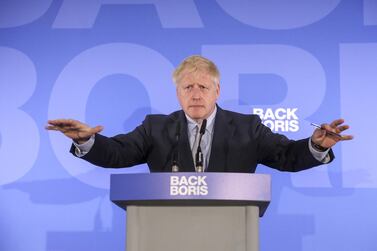Boris Johnson topped the first ballot to become the new UK prime minister after gaining 114 of 313 votes from MPs of the ruling Conservative Party.
Three of the ten candidates were removed after failing to gain 16 votes each from Tory MPs.
Foreign secretary Jeremy Hunt came a distant second with 43 and Michael Gove, the environment secretary, came third with 37.
Thank you to my friends and colleagues in the Conservative & Unionist Party for your support. I am delighted to win the first ballot, but we have a long way to go.https://t.co/tGRXu94CmT | @BackBoris pic.twitter.com/zVBNls2rew
— Boris Johnson (@BorisJohnson) June 13, 2019
Voting will continue over the coming weeks until there are only two candidates left. Conservative Party members, who appear to favour Mr Johnson, will then decide on the new leader via a postal ballot. If Mr Johnson continues to attract at least 114 votes from his fellow MPs he is guaranteed to a place in the members vote.
Delighted to come second today. We face a crucial choice: who can negotiate some better choices than the bad ones we face. The stakes have rarely been higher for our country. This serious moment calls for a serious leader. #hastobehunt
— Jeremy Hunt (@Jeremy_Hunt) June 13, 2019
The former mayor of London is the figurehead of a ruthless campaign machine that has shielded him from media exposure. The organisers of the Conservative ballot were forced to ban mobile phones from the voting room after the team of Mr Johnson reportedly demanded MPs photograph their papers to prove they had backed him.
The former foreign secretary has said the UK must leave the European Union on October 31, with or without a deal, but insists his priority is a managed withdrawal.
“I am delighted to win the first ballot, but we have a long way to go,” Mr Johnson tweeted.
Mr Johnson said: "We face a crucial choice: who can negotiate some better choices than the bad ones we face. The stakes have rarely been higher for our country. This serious moment calls for a serious leader."
Outgoing prime minister Theresa May announced she would step down from the role after her withdrawal agreement with the EU was rejected three times by parliament. As a result, she was forced to delay Brexit twice, with the current departure date now October 31.
The ensuing impasse has infuriated Eurosceptic Conservative members, many of whom advocate for a ‘hard’ or no-deal Brexit. Opponents of this move say it could be catastrophic for the UK economy.
More candidates are expected to drop out before the next round but seemingy not the insurgent International Development secretary, Rory Stewart who has held the most talked about of the contest so far and squeaked into last place among MPs with 19 backers.
THANK YOU - to all my colleagues who voted for me. We can win this. Realism, action, unity, trust. Thank you #RoryWalksOn
— Rory Stewart (@RoryStewartUK) June 13, 2019








